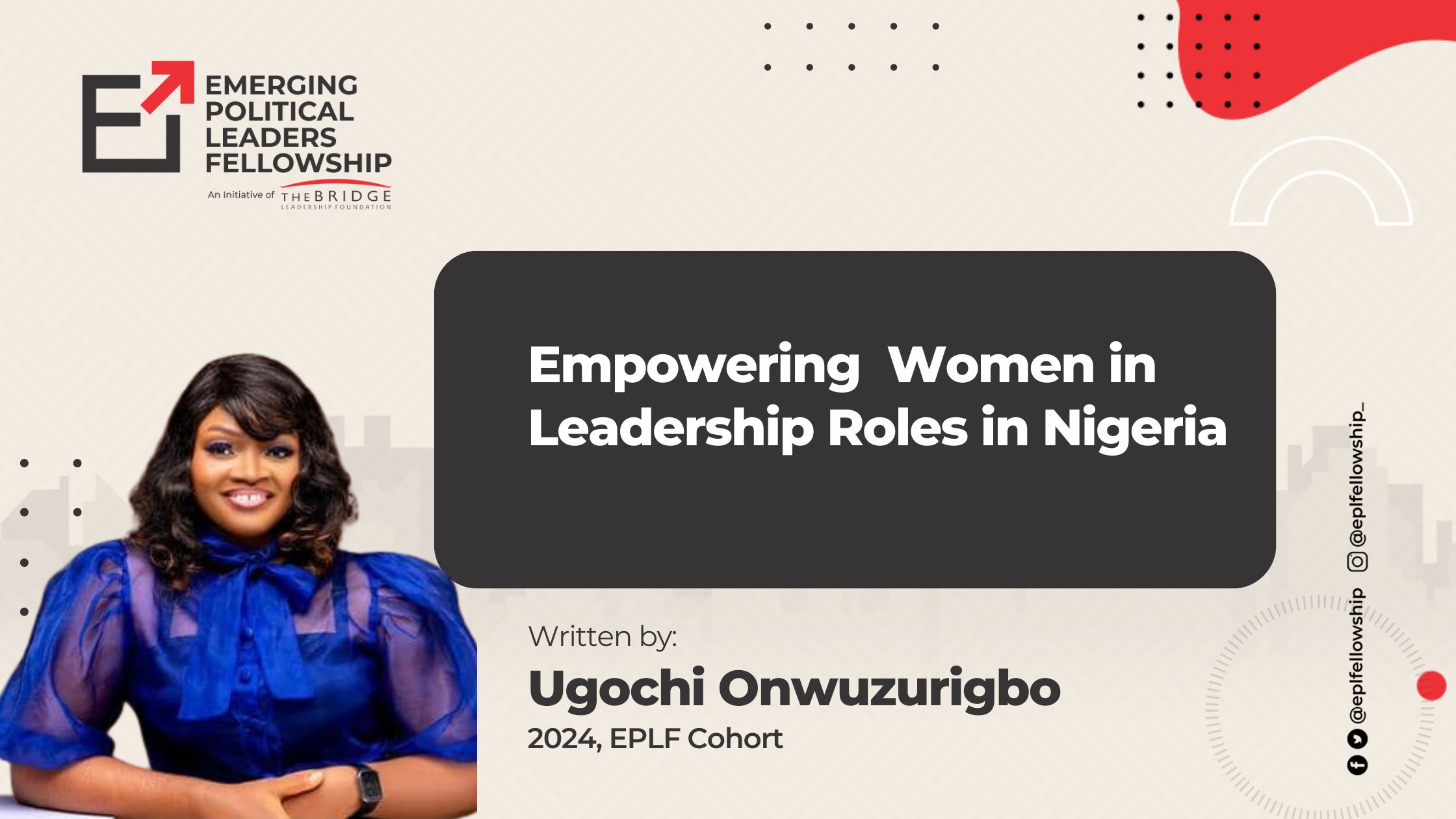Article by Ugochi Cindy Onwuzurigbo, 2024 EPLF Cohort Fellow
Introduction
Empowering women, particularly in leadership roles, is crucial for sustainable development. In Nigeria, traditional gender norms often restrict women’s participation in decision-making processes and leadership positions. Despite significant progress, barriers persist, hindering the full realization of women’s potential in various sectors, including politics, business, and society.
Current Landscape
Research consistently shows that diverse leadership teams drive better performance and innovation. Women bring unique perspectives that enhance problem-solving and decision-making. In Nigeria, women constitute a significant portion of the population, but their inclusion in leadership and addressing socio-economic challenges has been overlooked. Women remain underrepresented in leadership positions to this day.
According to the World Economic Forum, Nigeria ranks low on the Global Gender Gap Index, particularly in political empowerment. While there have been strides, such as the appointment of women to high-profile positions and the establishment of initiatives aimed at promoting gender equality, systemic barriers remain. How do we change this norm? When I hear the names of female leaders who have thrived against societal norms, I am filled with joy, knowing the significant hurdles they have overcome. Their achievements prove that women can lead and inspire, but the path is laden with obstacles that need addressing.
Barriers to Women’s Leadership
- Traditional Beliefs: Leadership is often seen as a male domain, discouraging many women from pursuing such roles. Cultural biases undermine their authority and contributions.
- Educational Disparities: Although more girls are enrolled in classes and often excel, higher education and vocational training opportunities are not equally accessible, especially in remote areas. This limits women’s qualifications for leadership.
- Political and Financial Obstacles: Women face significant challenges in securing political nominations and funding for public office. The political environment in Nigeria can be hostile, with women facing intimidation, discrimination, and pressure to conform. Successful women often encounter propaganda that questions their achievements.
Initiative to Change the Status Quo: W.O.M.E.N L.E.D Initiatives
To effectively empower women in leadership roles in Nigeria, the following strategies can be explored under the “W.O.M.E.N L.E.D Initiatives,” which stands for Women’s Opportunities for Mentorship, Education, Networking, Leadership, Engagement, and Development.
- Women’s Opportunities: Creating avenues for women to access resources and support systems will facilitate their entry into leadership roles. This includes initiatives to ensure they can apply for loans, grants, and business development opportunities. I have worked on creating such avenues by exposing women to these opportunities and providing training on how to thrive in their ventures.
- Mentorship: Establishing mentorship programs that connect aspiring women leaders with experienced mentors will provide guidance, support, and encouragement. Awareness campaigns highlighting successful women leaders in Nigeria can inspire others and challenge societal stereotypes.
- Education: Increasing access to quality education and leadership training will equip women with the necessary skills and knowledge to excel in leadership positions. Beyond formal education, programs like the digital literacy training I implemented, focusing on essential skills such as using computers, smartphones, the internet, and Microsoft tools, ensure women can navigate the digital space effectively.
- Networking Opportunities: Promoting platforms for women to connect, build professional relationships, share experiences, and access mentorship opportunities can enhance their leadership prospects. These networks can be both online and in-person.
- Leadership: Advocating for gender equality in leadership roles and representation is crucial. Collaborating with governmental and non-governmental organizations to promote policies that enforce gender quotas and women’s participation in politics, governance, and corporate sectors is essential.
- Engagement: Actively involving communities in discussions about women’s leadership and the importance of diversity fosters a supportive environment. Regular workshops on leadership, negotiation, communication, and public speaking can engage women in these critical areas.
- Development: Skill development initiatives should focus on empowering women with the tools they need to thrive. For example, workplace training programs I facilitated aim to ensure women become the best employees in their respective fields. Collaborating with businesses to implement corporate diversity and inclusion policies that prioritize women’s advancement is another key strategy. Legal reforms to protect women’s rights and promote gender equality in leadership and business opportunities are also essential.
Conclusion
Empowering women in leadership roles in Nigeria is not merely a gender equality scheme; it is about women’s development for the country’s overall transformation. By addressing the barriers women face and implementing effective strategies for empowerment, Nigeria can harness the full potential of its female population. The benefits of diverse leadership will contribute to a more just and prosperous society for all. Collective efforts from the government, civil society, and the private sector are needed to forge a brighter future, characterized by strong women leaders shaping the nation’s path forward. Let us work towards elevating women in Nigeria to the heights achieved by notable female leaders throughout history.
#cindywrites 2024

